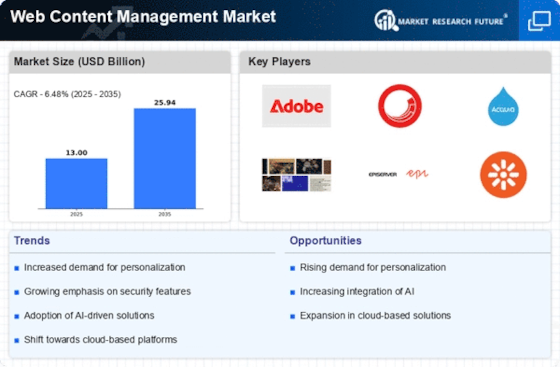Market Trends
Key Emerging Trends in the Web Content Management Market
The Web content management (WCM) market has been going through exquisite patterns, mirroring the developing scene of online content advent and control. One great sample is the rising demand for custom-designed and dynamic content material conveyance. Organizations are perceiving the importance of fitting content material to characterize consumer inclinations to improve customer enjoyment and commitment. This has induced the reception of reducing-edge WCM preparations that empower the creation and conveyance of customized content in mild of customer behavior, socioeconomics, and other crucial records. Moreover, the coordination of Computerized reasoning (artificial intelligence) and AI innovations is reshaping the WCM scene. Organizations are using artificial intelligence to robotize content advent, improve content for web indexes, and investigate customer facts to make informed conclusions about content methods. Simulated intelligence-driven WCM preparations are assisting associations with smoothing out their content material cycles, enhancing effectiveness, and producing more vital and drawing-in content to their crowds. The ascent of headless and decoupled CMS designs is also a distinguished sample in the Web content management market. Customary CMS preparations firmly couple the content material introduction and display layers, limiting adaptability and versatility. Headless CMS, on the other hand, isolates the content control and conveyance frameworks, permitting agencies to convey content across a huge number of gadgets productively and in greater ranges. This sample mirrors a shift toward greater precise and adaptable content material management preparations. Security and consistency worries have emerged as step-by-step extensive inside the WCM market. As corporations deal with and save loads of delicate records through their content material management frameworks, there is a development in carrying out sturdy safety efforts to shield against statistics breaks and assure consistency with hints like GDPR. Besides, the WCM market is seeing an ascent inside the reception of cloud-primarily based preparations. Cloud-primarily based WCM gives versatility, adaptability, and price-viability, making it an attractive desire for agencies, everything being equal. The ability to get to and oversee content material from wherever and the reduced framework prices associated with cloud association upload to the rising notoriety of this pattern.


















Leave a Comment